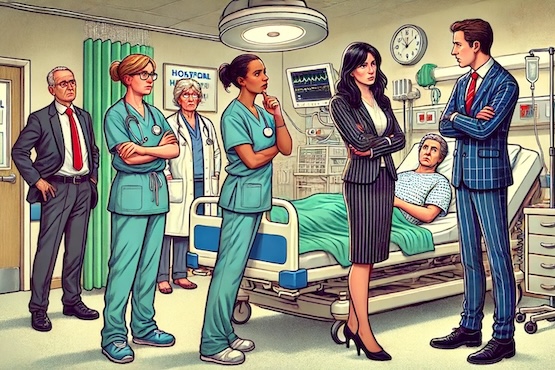Scapegoating and bullying rife in Scotland’s NHS, MSPs told

The NHS in Scotland suffers from a “blame culture” where scapegoating and bullying behaviour are too common and staff feel unable to raise problems informally, according to MiP evidence to a Scottish parliamentary inquiry.
In written evidence drawn from members’ comments and surveys, the union told the Scottish Parliament’s health and sport committee that NHS Scotland “is blame-orientated with a culture of formal grievances to resolve matters which should be discussed informally first”. This often leads to unnecessary and lengthy investigations, and a failure to “nip problems in the bud”, the report said.
MiP’s evidence also pointed to a widespread perception that managers trying to performance manage staff under NHS Scotland’s capability policy were often unfairly accused of bullying and harassment – and could suffer suspension for up to 18 months as a result.
Giving evidence before the committee on 30 May, MiP national officer Claire Pullar said people making complaints were rarely asked what they wanted out of the process. “Often they say, ‘I’d like an apology, I’d like it not to happen again, but I don’t want the manager suspended for 18 months while someone does an investigation that all my colleagues will have to go through as witnesses.”
She added: “How do we reintroduce certain skills that we have lost, such as talking to each other rather than putting in a grievance when people feel ticked off with with one of their managers?”
Mobbing and gaslighting
The union also highlighted how forms of bullying behaviour against managers such as ‘mobbing’ and ‘gaslighting’, which often go unrecognised, could lead to managers taking sick leave from work or needing mental health support.
“Unacceptable behaviour is sometimes used to bring a senior manager down. Senior managers experience ‘mobbing’ actions that can lead to them being removed from their roles,” said the report. It said ‘gaslighting’, a form of psychological manipulation involving deliberate distorting or denying of the truth, was an increasingly serious problem and should be recognised as a form of bullying behaviour.
MiP also criticised both the Scottish and UK governments for scapegoating NHS managers and treating them with disdain. “They are referred to a ‘bureaucrats’ and not as they should be seen – as skilled, essential managers deliver patient-centric health services,” said the union’s report. “Our members are entitled to dignity in their workplace as the guardians of staff who report to them – clinical and administrative.”
Devastating impact on careers
In response to questions from the committee about whistleblowing policies in the NHS in Scotland, Pullar warned that, although vital, many managers saw whistleblowing as another “blame-orientated” process.
She told the committee: “I have evidence from senior managers here who say they have never seen someone raise concerns through whistleblowing and not seen it have a devastating impact on them personally – whether it’s on their career or their relationships with colleagues.
|
Doctor, comedian, broadcaster, writer, health campaigner and politician manqué, Dr Phil Hammond is now drawing up a manifesto to rescue the NHS and boost the nation’s health. On the eve of a watershed general election for the UK, he spoke to Healthcare Manager’s Matt Ross.
03 July 2024
| By Matt Ross
Interview
|
|||||
|
ELECTION 2024:We look at four looming trouble spots you won’t hear much about in the campaign.
21 June 2024
| By Craig Ryan
Feature
|
|||||
|
ELECTION 2024:We look at what the experts say about six key challenges facing the NHS: waiting lists, workforce, social care, reform, buildings and technology. Do Labour or the Conservatives have the policies to meet them?
18 June 2024
| By Rhys McKenzie & Craig Ryan
Feature
|
|||||
|
ELECTION 2024:As polling day nears, Jon Restell and Rhys McKenzie set out MiP’s agenda for the next government: supporting the workforce, stabilising the health and care system, boosting productivity and giving managers freedom to do their jobs.
17 June 2024
| By Rhys McKenzie & Jon Restell
Feature
|
|||||
|
Joining the Scottish health department weeks before the pandemic struck, Caroline Lamb found herself head of NHS Scotland within a year. She talks about the “intense and scary” experience of managing through the Covid crisis, her plans to integrate services and tackle staff shortages and why Scotland needs more money for health and care.
12 April 2024
| By Matt Ross
Interview
|
|||||
|
With ambitious plans but little money to spend, a Labour government will need the skills, nerve and insight of managers to make its promise of a ‘decade of renewal’ in the NHS a reality.
11 January 2024
| By Jon Restell
Leading Edge
|
|||||
|
Latest figures show black and minority ethnic staff in the NHS are still denied the same opportunities for promotion and career development as white colleagues. We investigate why a public service that’s more diverse than ever before is still failing to root out race discrimination.
25 July 2023
| By Craig Ryan
Feature
|
|||||
|
We need to challenge the widely-held belief that all-powerful managers are blocking change in the NHS. It’s a lack of empathy for the difficult choices and hard realities that managers face which is holding us back.
27 April 2023
| By Jon Restell
Leading Edge
|
|||||
|
The social care shake-up in Scotland will affect the lives of more than a million people and could have far-reaching repercussions for local government and the NHS. But are the reforms missing the point?
24 January 2023
| By Craig Ryan
Feature
|
|||||
|
For most NHS managers, unfair criticism is like water off a duck’s back. But the denigration and devaluing of management does real damage to the NHS. Here’s how MiP plans to take on the manager-bashers and promote a positive view of the vital work managers do.
14 December 2022
| By Craig Ryan
Analysis & opinion
|
|||||
|
Related News
-

Helen Carr retires, Jamie Briers steps up and Rosie Kirk joins MiP
Helen Carr’s retirement as MiP’s head of operations at the end of September marks the end of a long and distinguished career in the trade union movement and public service, writes Jon Restell.
-

Government unveils barring scheme for executive-level managers
MiP has welcomed the government’s decision to limit its barring scheme to the most senior NHS managers, but says the proposal is “a small piece of the jigsaw”.
-

Confusion and lack of cash delays ICB job cuts
At least a dozen Integrated Care Boards have paused or postponed redundancy programmes because of a lack of funding and continuing confusion over transferring staff to other NHS organisations under government reform plans.








